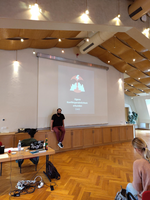Between mosquito and elephant: conflict regulation and attitude at empiriecom
31. Okt 2024
The latest series of workshops at empiriecom focussed on two key topics: conflicts and attitude. With the support of working student Leo, Marcel led the participants through an intensive exchange on these aspects, which play a major role in both professional and private contexts. In doing so, Marcel and Leo drew on the theories of Klaus Eidenschink and Martin Permantier.
Lesezeit: 2,5 Minuten
The latest series of workshops at empiriecom focussed on two key topics: conflicts and attitude. With the support of working student Leo, Marcel led the participants through an intensive exchange on these aspects, which play a major role in both professional and private contexts. In doing so, Marcel and Leo drew on the theories of Klaus Eidenschink and Martin Permantier.
Why conflicts help us move forward
It may sound unusual, but the workshop began with the statement: ‘Dear conflicts, it's nice that you exist!’ - a provocative invitation to look at the topic of conflict from a different perspective. The central message: conflicts are part of everyday life and wanting to avoid them is human. But instead of avoiding conflicts or letting them escalate, the real challenge lies in between - in consciously regulating them.
A particular focus was placed on analysing one's own conflict personality. Self-reflection helped the participants to understand their behavioural patterns in conflict situations and to find out which of these are functional and which they would like to change in the future.
Marcel and Leo also presented three key distinctions that help to better categorise and regulate conflicts. One example: the ‘attention mode’. This involves either calming a conflict by specifying the problem (‘making a mosquito out of a mosquito’) or fuelling the conflict by generalising it (‘making a mosquito out of an elephant’). Both poles can be functional depending on the situation - the trick is to use them consciously.


Attitude - the invisible motor
The second part of the workshop focussed intensively on the topic of posture. Although posture is not directly visible, it has a significant influence on our behaviour, our communication and our dealings with other people. Marcel and Leo explained how attitude fits into the organisational context and what the difference is between learning and development.
Using Martin Permantier's concept of the six attitudes, the participants learnt that the primary aim is not necessarily to achieve the ‘most mature’ attitude, but to reflect on oneself and consciously perceive one's own attitude. This self-observation helps us to better understand how we effectively control ourselves in order to react functionally in conflicts and to recognise when we fall back into previous attitudes.
A practical exercise in which the participants analysed their own attitude patterns and needs made it possible to become more aware of these in conflict situations and to regulate them.
From theory to practice
At the end of the workshop, the aim was to transfer the knowledge gained to the work at empiriecom. Where do conflicts occur in the company? How do they manifest themselves and how can we deal with them functionally? One method that was used was ‘TRIZ’ from the Liberating Structures - a creative exercise in which the participants first collected which behaviours would be particularly dysfunctional in the most important conflicts. They then reflected on which of these dysfunctional behaviours we at empiriecom exhibit ourselves in some form. The final step was to consider how we could stop these dysfunctional behaviours or regulate them more effectively.
What remains?
The workshop offered many valuable ideas for improving both individual conflict regulation skills and attitudes in challenging situations. Self-reflection was a particular focus - not only for the professional sphere, but also for the private sphere.
In eight workshops with 65 participants from different teams, it was a colourful, interdisciplinary exchange that went far beyond the boundaries of individual teams. The next steps include the further development of conflict regulation skills and the provision of coaching formats to practise these skills on an ongoing basis.
Outlook for 2025
There are no plans to introduce a new theoretical topic in the coming year. Instead, the focus will be on deepening, trialling and further developing previous findings. The aim is to experience the interactions and connections between the topics of the last three years - communication and feedback, (self-)leadership, attitude and conflict - in practice, to reflect on them together and to learn from each other.
This series of workshops impressively demonstrates how important it is to constantly reflect on yourself, to deal with your own development and to grow together step by step.



